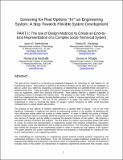| dc.description.abstract | The goal of this research is to develop an analytical framework for screening for real options “in” an
engineering system. Real options is defined in the finance literature as the right, but not the obligation, to
take an action (e.g. deferring, expanding, contracting, or abandoning) at a predetermined cost and for a
predetermined time. These are called "real options" because they pertain to physical or tangible assets,
such as equipment, rather than financial instruments. Real options improve a system’s capability of
undergoing classes of changes with relative ease. This property is often called “flexibility.” Recently, the
DoD has emphasized the need to develop flexible system in order to improve operational, technical, and
programmatic effectiveness. The aim of this research is to apply real options thinking to weapon
acquisitions in order to promote the ability of weapon system programs to deftly avoid downside
consequences or exploit upside opportunities. | en_US |

